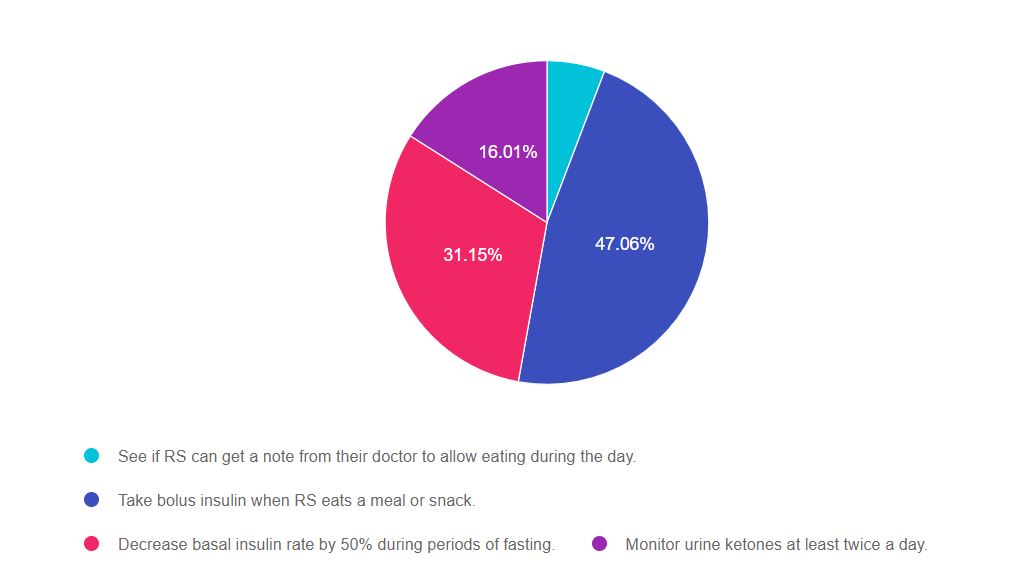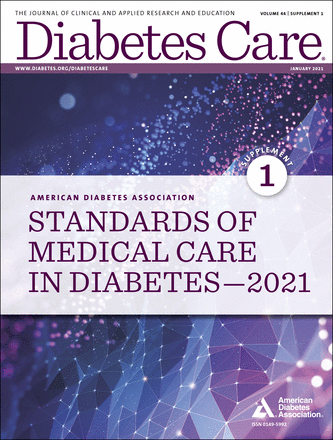
For our April 6th Question of the Week, 47% of respondents chose the best answer. We wanted to “take a closer look” into this question.
Before we start though, if you don’t want any spoilers and haven’t tried the question yet, you can answer below: Answer Question
Question: RS observes Ramadan and fasts from sunrise to sunset. RS is 13 years old, has type 1 diabetes, uses an insulin pump and CGM. RS’s insulin-to-carb ratio is 1:12 and correction is 1:45. Basal settings range from 0.5 -1.2 units an hour.
What would be the best recommendation for RS to keep blood sugars in the target range during Ramadan?
Answer Choices:
- See if RS can get a note from their doctor to allow eating during the day.
- Take bolus insulin when RS eats a meal or snack.
- Decrease basal insulin rate by 50% during periods of fasting.
- Monitor urine ketones at least twice a day.

As shown above, the most common choice was option 2, the second most common answer was option 3, then option 4, and finally option 1.
Getting to the Best Answer
If you are thinking about taking the certification exam, the content of this practice test question will set you up for success. The exam will present questions that require test takers to make sure the answer matches the ADA Standards of Care and best clinical practice.
Answers & Rationale
Answer 1 is incorrect, 5.79% chose this answer, “See if RS can get a note from their doctor to allow eating during the day.” As diabetes specialists, we are at our best when we tap into our cultural humility. We may not be familiar with the customs and celebrations of other cultures, but we can honor these traditions and express sincere interest in learning more about them. In this situation, we would respect their tradition, explore potential issues surrounding fasting and help with problem solving and creating a back up plan in case an issue arises.
Answer 2 is correct, 47.06% of you chose this answer, “Take bolus insulin when RS eats a meal or snack.” Good Job! When the basal rates of an insulin pump are set correctly, a person with type 1 diabetes can fast and still keep glucose on target. This background or basal insulin works to manage glucose levels in between meals and through the night. Actually, this period of fasting will provide an opportunity to evaluate if basal settings need adjustment or if they are set correctly. When RS breaks the fast at sunset, they will just need to dose for carbohydrates and cover for hyperglycemia if needed.
Answer 3 is incorrect, 31.15% of you chose this answer, “Decrease basal insulin rate by 50% during periods of fasting.” When the basal rates of an insulin pump are set correctly, a person with type 1 diabetes can fast and still keep glucose on target. This background or basal insulin works to manage glucose levels in between meals and through the night. If RS is receiving too much basal insulin and experiences low blood sugars during periods of fasting, they will need to fine tune their basal rates. However, we would not suggest to automatically decrease basal rate by 50% in preparation for fasting.
Answer 4 is correct, 16.01% of you chose this answer, “Monitor urine ketones at least twice a day.” Since RS has an insulin pump that delivers basal insulin 24 hours a day, they are at low risk for ketosis. Ketosis is usually a result of insufficient insulin administration. Without adequate insulin, fats are utilized as an alternate energy source, leading to positive ketones. In this situation, RS is receiving adequate insulin through the pump and is not at increased risk of significant ketosis.
We hope you appreciate this week’s rationale! Thank you so much for taking the time to answer our Question of the Week and participate in this fun learning activity!
On Sale | Now just $24.95
ADA 2021 Standards of Medical Care in Diabetes Book

The ADA Standards of Medical Care in Diabetes is a key resource for healthcare professionals involved in diabetes care, education, and support.
One of the most important pieces of literature to read prior to becoming a Diabetes Care and Education Specialist and for clinical practice, the Standards of Care book is a study must!
The book includes:
- ADA’s standards for diagnosing and treating diabetes
- Nutrition recommendations and principles
- Position statements on managing diabetes and its complications in various settings
Sign up for Diabetes Blog Bytes – we post one daily Blog Byte from Monday to Friday. And of course, Tuesday is our Question of the Week. It’s Informative and FREE! Sign up below!
[yikes-mailchimp form=”1″]Accreditation: Diabetes Education Services is an approved provider by the California Board of Registered Nursing, Provider 12640, and Commission on Dietetic Registration (CDR), Provider DI002. Since these programs are approved by the CDR it satisfies the CE requirements for the CDCES regardless of your profession.*
The use of DES products does not guarantee the successful passage of the CDCES exam. CBDCE does not endorse any preparatory or review materials for the CDCES exam, except for those published by CBDCE.









